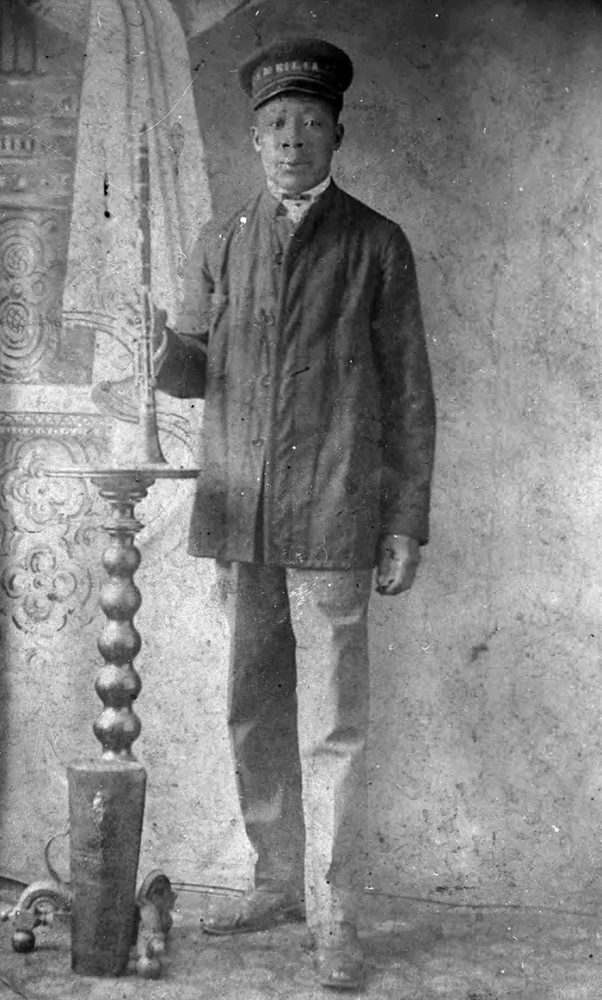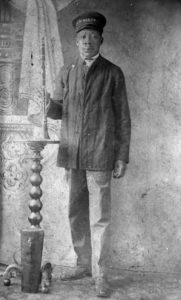Israel Gorman
Israel Gorman was an early traditional jazz and brass band clarinetist from New Orleans who played with the Preservation Hall Jazz Band, among others.

Courtesy of Louisiana State Museum
Israel Gorman. Rose, Al (Photographer)
Israel Gorman was an early traditional jazz and brass band clarinetist from New Orleans. Perhaps best remembered for his work with Kid Sheik and Kid Howard, Gorman was also a recognized brass band musician who played with multiple bands, including ones led by Manuel Perez, Wooden Joe Nicholas, and Peter Bocage. Gorman’s artistry on clarinet was much celebrated and led to work with George Guesnon, Cié Frazier, Punch Miller, Charlie Love, “Sweet” Emma Barrett, Kid Howard, and many others during his lifetime. Usually considered Gorman’s quintessential recording, Israel Gorman at Happy Landing (1954), is a lesser-known yet well-regarded work in the jazz canon.
Israel Gorman was born March 4, 1895, in the community of Oakville in Plaquemines Parish. He began playing cornet in his teens, though he soon switched to clarinet. A student of Alphonse Picou, Gorman also claimed to have studied with Lorenzo Tio Jr. While Gorman studied the method of Otto Langey (1851–1922), publisher of several classical music tutorial manuals, he was also influenced by the clarinetist Johnny Dodds and other early New Orleans jazz musicians, and he incorporated conservatory and amateur approaches to the instrument and its performance.
Gorman’s first band was a quartet led by George Jones at Tom Anderson’s Saloon in the Storyville red-light district of New Orleans in 1915, after which he joined the Young Tuxedo Orchestra. Gorman also became a skilled brass band performer during this time, frequently marching in bands led by Manuel Perez, Chris Kelly, Buddy Petit, and others. Gorman served in France in the military during World War I, and upon returning to his hometown he played with Buddy Petit around 1919 and with Wooden Joe Nicholas’s Camelia Band, named after the recreational steamer they played on that sailed Lake Pontchartrain (the Camelia). Later he would join Toots Johnson’s band and reunite with Buddy Petit’s band to play multiple gigs, including a tour in Florida.
The coming years would see Gorman playing in a federally funded Works Progress Administration (WPA) band during the Great Depression and taking jobs with dance bands in Chicago, Illinois, and New York City. Upon returning again to New Orleans, Gorman organized his own band and could often be found playing with Charlie Love at the New Orleans lakefront venue Happy Landing, across the street from the Shushan Airport. It was here that Gorman would record Israel Gorman at Happy Landing, released by the American record label. This album, considered his best recorded work, featured Charlie Love on trumpet, Joe Avery on trombone, Louis Gallaud on piano, Sam Charters on banjo, and Albert Jiles on drums. Three extra tracks are included from pianist Billie and trumpeter Dede Pierce‘s house band, recorded live at the New Orleans jazz venue Luthgens in 1954. Tracks on Israel Gorman at Happy Landing include “Eh La Bas,” “Who’s Sorry Now,” “St. Louis Blues,” and “Just a Closer Walk with Thee.”
In the early days of Preservation Hall, Gorman played regularly with Kid Howard’s band and Kid Sheik’s Storyville Ramblers, with whom he also recorded.
Gorman died on September 21, 1965, in New Orleans.
